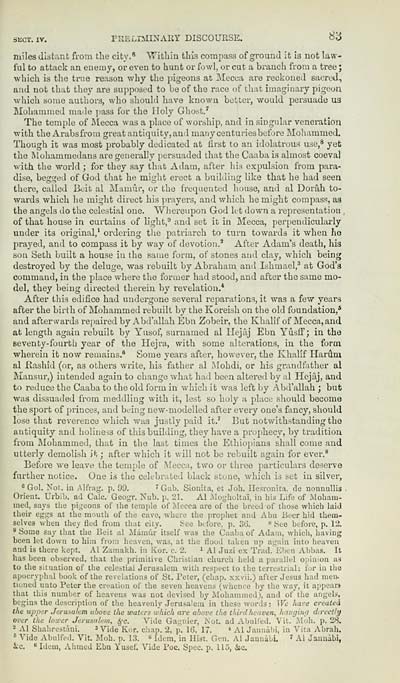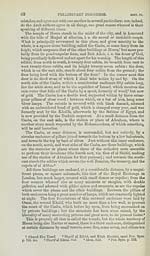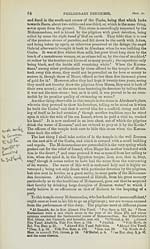Download files
Complete book:
Individual page:
Thumbnail gallery: Grid view | List view

SKCT. IV. PKELlMINAliY DISCOURSE. 83
miles distant from tlie city." "Witliin tLis compass of ground it is not law-
ful to attack an enemy, or even to hunt or fowl, or cut a branch from a tree ;
which is the true reason why the pigeons at Mecca are reckoned sacred,
and not that they are supposed to be of the race of that imaginary pigeon
which some authors, who should have known better, would persuade U3
Mohammed made pass for the Holy Ghost/
The temple of JStecca was a place of worship, and in singular venei-ation
with the Arabsfrom great antiquity, ami many centuries before Moliammed.
Though it was most probably dedicated at first to an idolatrous use,^ yet
the Mohammedans are generally persuaded that the Caaba is almost coeval
with the world ; for they say that Adam, after his expulsion from para-
dise, begged of God that he might erect a building like that he had seen
there, called licit al Mamur, or the frequented house, and al Dorah to-
wards which he might direct his prayers, and which he might compass, as
the angels do the celestial one. Whereupon God let down a i-epresentatiou ,
of that house in curtains of light,^ and set it in Mecca, perpendicularly
under its original,' ordering tlie patriarch to turn towards it when ho
prayed, and to compass it by way of devotion.^ After Adam's death, his
son Seth built a house in the same form, of stones and clay, which being
destroyed by the deluge, was rebuilt by Abraham and Ishmael,^ at God's
command, in the place where the former had stood, and after the same mo-
del, they being directed therein by revelation.*
After tliis edifice had undergone several reparations, it was a few years
after the birth of Mohammed rebuilt by the Koreish on the old foundation,*
and afterwards rejmired by Abd'allah Ebn Zobeir, the Khalif of Mecca, and
at length again rebuilt by Yusof, suruamed al Hejaj Ebn YusfT; in the
seventy-fourth year of tiie Hejra, with some alterations, in the form
wherein it now remains.* Some years after, however, the Khalif Harilm
al Rashid (or, as others write, his father al I\Iohdi, or his grandfather al
Mansur,) intended again to change what hail been altered by al Hejaj, and
to reduce the Caaba to the old form in which it was left by Abd'allah ; but
was dissuaded from meddling with it, lest so holy a place should become
the sport of princes, and being new-modelled after every one's fancy, should
lose that reverence which was justly paid it.^ But notwithstanding the
antiquity and holiness of this building, they have a prophecy, by tradition
from Mohammed, that in the last times the Ethiopians shall come and
utterly demolish i*-, ; after which it will not be rebuilt again for ever.*
Before we leave the temple of Mecca, two or three particulars deserve
further notice. One is the celebrated black stone, which is set in silver,
« Gol. Not. in Alfrag. p. 99. 7 Gab. S-ionita, et Joh. Hesronita, de nonnullis .
Orient. Urbib. ad Calc. Geogr. Nub. p. 21. Al iMogholtai, in his Life of Moham-
med, says the pigeons of the temple of Mecca are of the breed of those which laid
their eggs at the mouth of the cave, where the prophet and Abu Eeer hid them-
selves when they fled from that city. See before, p. 3G. ** See before, p. 12.
* Some say that the Beit al Mamilr itself was the Caaba of Adam, which, having
been let down to him from heaven, was, at the flood taken up again into heaven
and is there kept. Al Zamakh. in Kor. c. 2. ^ Al Juzi ex Trad. Eben Abbas. It
has been observed, that the primitive Christian church held a parallel opinion us
to the situation of the celestial Jerusalem with respect to the terrestrial: for in the
apocryphal book of the revelations of St. Peter, (chap, xxvii.) after Jesus had men.
tioned unto Peter the creation of the seven heavens (whence by the way, it appear*
that this number of heavens was not devised by Mohammed), and of the angels,
begins the description of the heavenly Jerusalem in these words : We have created
the upper Jerusalem above the waters which are above the third heaven, hnngina directly
over the lower Jerusalem, ^c. Vide Gagnier, Not. ad Abulfed. Vit. lhA\. p. 28.
'■^ Al Shahrestiini. ^ Vide Kor. chap. 2, p. 16, 17. * Al Janniibi, in Vita Abrah.
* Vide Abulfed. Vit. Moh. p. 13. » Idem, in Hist. Gen. Al JannabL ^ Al Jauuabi,
kc. 6 Idem, Ahmed Ebn Yusef. Vide Poc. Spec. p. 115, &c.
miles distant from tlie city." "Witliin tLis compass of ground it is not law-
ful to attack an enemy, or even to hunt or fowl, or cut a branch from a tree ;
which is the true reason why the pigeons at Mecca are reckoned sacred,
and not that they are supposed to be of the race of that imaginary pigeon
which some authors, who should have known better, would persuade U3
Mohammed made pass for the Holy Ghost/
The temple of JStecca was a place of worship, and in singular venei-ation
with the Arabsfrom great antiquity, ami many centuries before Moliammed.
Though it was most probably dedicated at first to an idolatrous use,^ yet
the Mohammedans are generally persuaded that the Caaba is almost coeval
with the world ; for they say that Adam, after his expulsion from para-
dise, begged of God that he might erect a building like that he had seen
there, called licit al Mamur, or the frequented house, and al Dorah to-
wards which he might direct his prayers, and which he might compass, as
the angels do the celestial one. Whereupon God let down a i-epresentatiou ,
of that house in curtains of light,^ and set it in Mecca, perpendicularly
under its original,' ordering tlie patriarch to turn towards it when ho
prayed, and to compass it by way of devotion.^ After Adam's death, his
son Seth built a house in the same form, of stones and clay, which being
destroyed by the deluge, was rebuilt by Abraham and Ishmael,^ at God's
command, in the place where the former had stood, and after the same mo-
del, they being directed therein by revelation.*
After tliis edifice had undergone several reparations, it was a few years
after the birth of Mohammed rebuilt by the Koreish on the old foundation,*
and afterwards rejmired by Abd'allah Ebn Zobeir, the Khalif of Mecca, and
at length again rebuilt by Yusof, suruamed al Hejaj Ebn YusfT; in the
seventy-fourth year of tiie Hejra, with some alterations, in the form
wherein it now remains.* Some years after, however, the Khalif Harilm
al Rashid (or, as others write, his father al I\Iohdi, or his grandfather al
Mansur,) intended again to change what hail been altered by al Hejaj, and
to reduce the Caaba to the old form in which it was left by Abd'allah ; but
was dissuaded from meddling with it, lest so holy a place should become
the sport of princes, and being new-modelled after every one's fancy, should
lose that reverence which was justly paid it.^ But notwithstanding the
antiquity and holiness of this building, they have a prophecy, by tradition
from Mohammed, that in the last times the Ethiopians shall come and
utterly demolish i*-, ; after which it will not be rebuilt again for ever.*
Before we leave the temple of Mecca, two or three particulars deserve
further notice. One is the celebrated black stone, which is set in silver,
« Gol. Not. in Alfrag. p. 99. 7 Gab. S-ionita, et Joh. Hesronita, de nonnullis .
Orient. Urbib. ad Calc. Geogr. Nub. p. 21. Al iMogholtai, in his Life of Moham-
med, says the pigeons of the temple of Mecca are of the breed of those which laid
their eggs at the mouth of the cave, where the prophet and Abu Eeer hid them-
selves when they fled from that city. See before, p. 3G. ** See before, p. 12.
* Some say that the Beit al Mamilr itself was the Caaba of Adam, which, having
been let down to him from heaven, was, at the flood taken up again into heaven
and is there kept. Al Zamakh. in Kor. c. 2. ^ Al Juzi ex Trad. Eben Abbas. It
has been observed, that the primitive Christian church held a parallel opinion us
to the situation of the celestial Jerusalem with respect to the terrestrial: for in the
apocryphal book of the revelations of St. Peter, (chap, xxvii.) after Jesus had men.
tioned unto Peter the creation of the seven heavens (whence by the way, it appear*
that this number of heavens was not devised by Mohammed), and of the angels,
begins the description of the heavenly Jerusalem in these words : We have created
the upper Jerusalem above the waters which are above the third heaven, hnngina directly
over the lower Jerusalem, ^c. Vide Gagnier, Not. ad Abulfed. Vit. lhA\. p. 28.
'■^ Al Shahrestiini. ^ Vide Kor. chap. 2, p. 16, 17. * Al Janniibi, in Vita Abrah.
* Vide Abulfed. Vit. Moh. p. 13. » Idem, in Hist. Gen. Al JannabL ^ Al Jauuabi,
kc. 6 Idem, Ahmed Ebn Yusef. Vide Poc. Spec. p. 115, &c.
Set display mode to: Large image | Transcription
Images and transcriptions on this page, including medium image downloads, may be used under the Creative Commons Attribution 4.0 International Licence unless otherwise stated. ![]()
| Early Gaelic Book Collections > J. F. Campbell Collection > Koran: or, Alcoran of Mohammed > (105) |
|---|
| Permanent URL | https://digital.nls.uk/77135250 |
|---|
| Description | Volumes from a collection of 610 books rich in Highland folklore, Ossianic literature and other Celtic subjects. Many of the books annotated by John Francis Campbell of Islay, who assembled the collection. |
|---|
| Description | Selected items from five 'Special and Named Printed Collections'. Includes books in Gaelic and other Celtic languages, works about the Gaels, their languages, literature, culture and history. |
|---|

